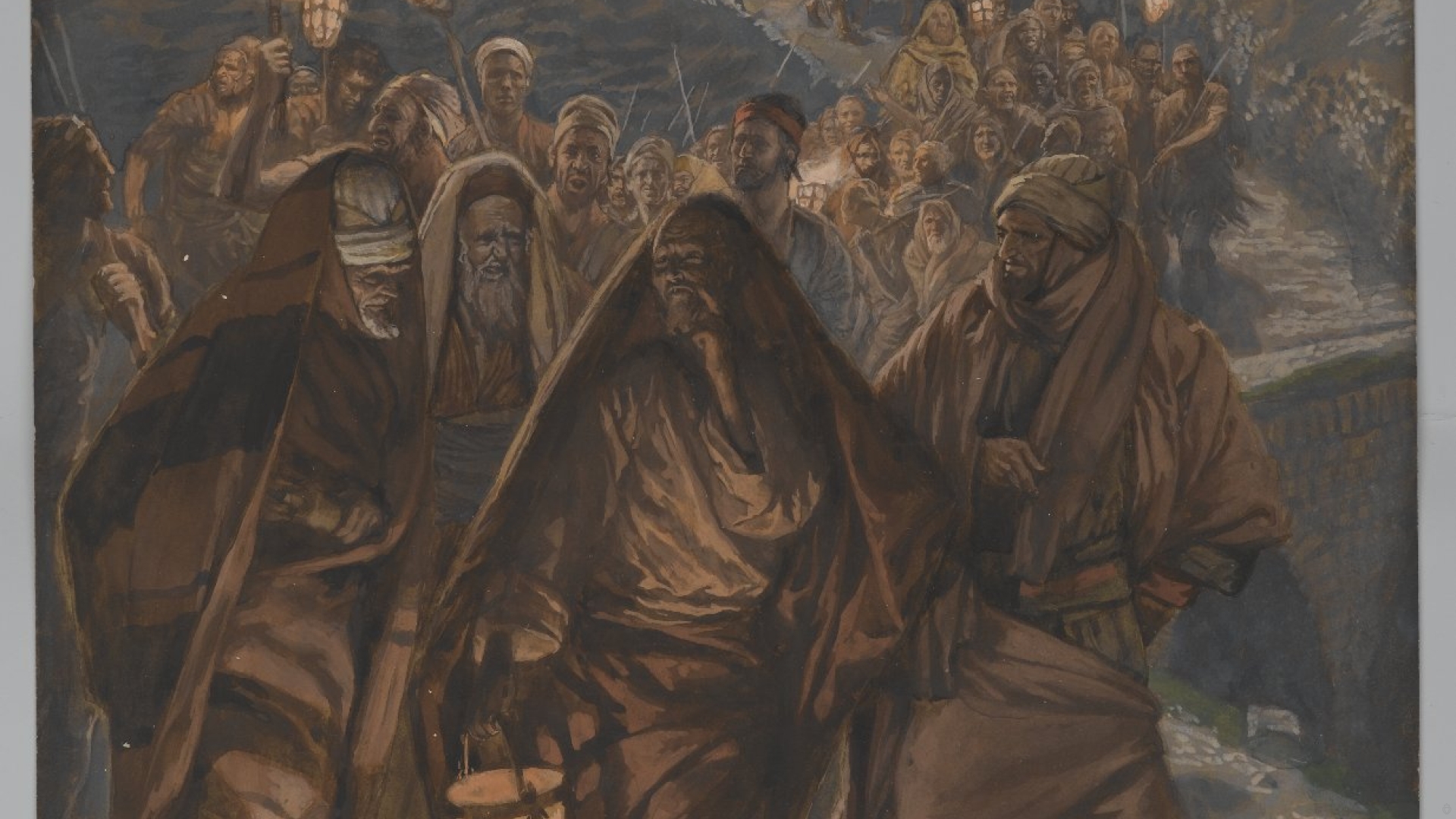St. John Chrysostom’s Homily for Spy Wednesday

"The Procession of Judas" - James Tissot c. 1890
Holy Wednesday, historically referred to in the West as Spy Wednesday (“spy” meaning to ambush or ensnare), is the time where the Universal Church recalls Judas’s intention to betray his master, Our Lord Jesus Christ.
Liturgical Background
At the traditional Latin Mass, the Gospel of Luke 22:39-71 & 23:1-53 is appointed to be read. That account of Our Lord’s Passion includes Judas’s betrayal at Gethsemane. In the Byzantine Rite, Judas’s betrayal is also recounted, this time with the reading of the Gospel of Matthew 26:6-16 at the evening Presanctified Liturgy of Pope St. Gregory the Great.
The following text are excerpts from St. John Chrysostom’s 80th Homily on Matthew.
St. John’s Homily
Then went one of the twelve, he that was called Judas Iscariot, unto the chief priests, and said unto them, What will you give me, and I will deliver Him unto you?
Then. When? When these things were spoken, when He had said, it is for my burial, and not even thereby was he moved to compunction, neither when he heard that the Gospel should be preached everywhere did he fear (and yet it was the language of unspeakable power), but when women showed so much honor, and women that had been harlots, then he wrought the devil's works.
So great an evil is covetousness, this made him both a traitor, and a sacrilegious robber. Hearken, all you covetous, you that have the disease of Judas; hearken, and beware of the calamity. For if he that was with Christ, and wrought signs, and had the benefit of so much instruction, because he was not freed from the disease, was sunk into such a gulf; how much more shall you, who do not so much as listen to the Scripture, who are constantly riveted to the things present, become an easy prey to this calamity, unless you have the advantage of constant care.
Every day was that man with Him, who had not where to lay His head, and every day was he instructed by deeds, and by words, not to have gold, nor silver, nor two coats; and yet he was not taught self-restraint; and how do you expect to escape the disease, if you have not the benefit of earnest attention, and dost not use much diligence? For terrible, terrible is the monster, yet nevertheless, if you be willing, you will easily get the better of him. For the desire is not natural; and this is manifest from them that are free from it. For natural things are common to all; but this desire has its origin from remissness alone; hence it takes its birth, hence it derives its increase, and when it has seized upon those who look greedily after it, it makes them live contrary to nature. For when they regard not their fellow countrymen, their friends, their brethren, in a word all men, and with these even themselves, this is to live against nature.
Whence it is evident that the vice and disease of covetousness, wherein Judas, being entangled, became a traitor, is contrary to nature. And how did he become such a one, you may say, having been called by Christ? Because God's call is not compulsory, neither does it force the will of them who are not minded to choose virtue, but admonishes indeed, and advises, and does and manages all things, so as to persuade men to become good; but if some endure not, it does not compel. But if you would learn from what cause he became such as he was, you will find him to have been ruined by covetousness.
And how was he taken by this calamity? One may say. Because he grew remiss. For hence arise such changes, as on the other hand, those for the better from diligence. How many for instance that were violent, are now more gentle than lambs? How many lascivious persons have become afterwards continent? How many, heretofore covetous, yet now have cast away even their own possessions? And the contrary again has been the result of remissness…
And all these things have I said, to show that if we be vigilant, no one shall harm us; and that the harm arises not from poverty but from ourselves. Wherefore I beseech you with all diligence to put away the pest of covetousness, that we may both be wealthy here, and enjoy the good things eternal, unto which God grant we may all attain, by the grace and love towards man of our Lord Jesus Christ, to whom be glory world without end. Amen.
US District - sspx.org - 03/26/2024





